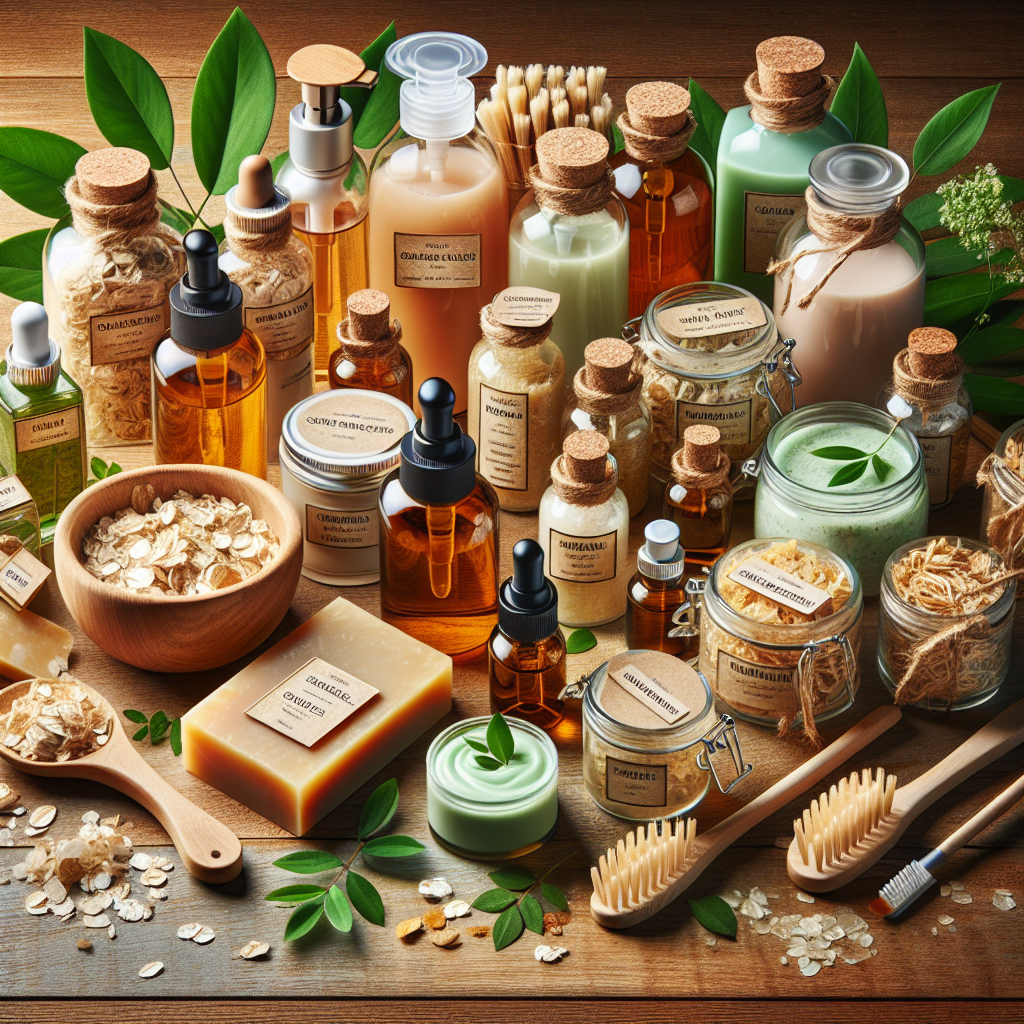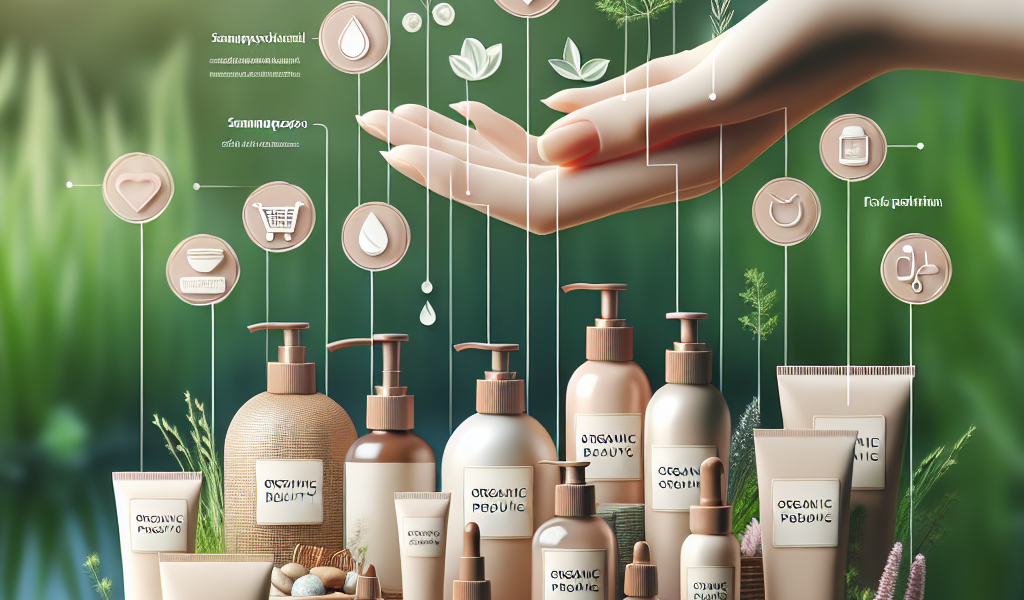-
Table of Contents
“Glow Naturally: Embrace Purity with Organic Beauty Products”
Introduction

In recent years, there has been a significant shift towards more natural and sustainable living, and this trend has extended into the realm of beauty and personal care. Organic beauty products, which are formulated with ingredients derived from natural sources and produced without synthetic chemicals, have gained immense popularity. The benefits of using organic beauty products are manifold, ranging from improved skin health to environmental sustainability. These products are often free from harmful toxins and irritants, making them suitable for all skin types, including sensitive skin. Additionally, organic beauty products are typically cruelty-free and eco-friendly, aligning with the values of consumers who are conscious about their impact on the planet. By choosing organic beauty products, individuals can enhance their well-being while contributing to a healthier and more sustainable world.
Healthier Skin with Natural Ingredients
In recent years, the beauty industry has seen a significant shift towards organic products, and for good reason. As consumers become more conscious of what they put on their skin, the demand for natural ingredients has surged. Organic beauty products, which are free from synthetic chemicals and harmful additives, offer a plethora of benefits that contribute to healthier skin. This growing trend is not just a passing fad but a movement towards a more sustainable and health-conscious lifestyle.
One of the primary advantages of using organic beauty products is the absence of harsh chemicals. Conventional beauty products often contain parabens, sulfates, and synthetic fragrances, which can cause skin irritation, allergies, and even long-term health issues. In contrast, organic products are formulated with natural ingredients such as plant extracts, essential oils, and minerals. These components are not only gentle on the skin but also provide nourishment and hydration. For instance, ingredients like aloe vera, chamomile, and lavender are known for their soothing properties, making them ideal for sensitive skin.
Moreover, organic beauty products are rich in antioxidants, vitamins, and essential fatty acids that promote skin health. Antioxidants like vitamin C and E help combat free radicals, which are responsible for premature aging and skin damage. By incorporating these natural elements into your skincare routine, you can achieve a radiant and youthful complexion. Additionally, essential fatty acids found in ingredients like argan oil and jojoba oil help maintain the skin’s moisture barrier, preventing dryness and flakiness.
Another compelling reason to switch to organic beauty products is their environmental impact. The production of conventional beauty products often involves harmful chemicals that can pollute water sources and harm wildlife. Organic farming practices, on the other hand, prioritize sustainability and environmental preservation. By choosing organic products, you are supporting eco-friendly practices that reduce your carbon footprint and contribute to a healthier planet.
Furthermore, organic beauty products are cruelty-free and ethically sourced. Many conventional beauty brands still engage in animal testing, a practice that is both inhumane and unnecessary. Organic brands, however, are committed to cruelty-free practices and often carry certifications from organizations like Leaping Bunny or PETA. This ethical approach extends to the sourcing of ingredients as well. Organic products are typically made with fair-trade ingredients, ensuring that the farmers and workers involved in their production are treated fairly and paid justly.
In addition to these benefits, organic beauty products often come in eco-friendly packaging. Many brands are moving towards biodegradable, recyclable, or reusable packaging to minimize waste. This not only helps reduce the environmental impact but also aligns with the values of consumers who are looking to make more sustainable choices.
While the initial cost of organic beauty products may be higher than their conventional counterparts, the long-term benefits far outweigh the price difference. Investing in products that are good for your skin and the environment is a decision that pays off in the long run. Your skin will thank you for the gentle, nourishing care, and you can feel good knowing that you are making a positive impact on the planet.
In conclusion, the benefits of using organic beauty products are manifold. From healthier skin to a healthier planet, the advantages are clear. As more people become aware of the importance of natural ingredients and sustainable practices, the shift towards organic beauty products is likely to continue. Embracing this change not only enhances your skincare routine but also contributes to a more ethical and environmentally friendly lifestyle.
Environmental Impact of Organic Beauty Products
The beauty industry has seen a significant shift towards organic products in recent years, driven by a growing awareness of environmental sustainability and personal health. As consumers become more conscious of the ingredients in their skincare and cosmetic products, the demand for organic alternatives has surged. This trend is not just a passing fad; it reflects a deeper understanding of the environmental impact of our daily choices.
One of the most compelling reasons to switch to organic beauty products is their reduced environmental footprint. Conventional beauty products often contain synthetic chemicals, many of which are derived from petroleum. The extraction and processing of these chemicals contribute to pollution and the depletion of non-renewable resources. In contrast, organic beauty products are made from natural ingredients that are sustainably sourced. This means that the farming practices used to grow these ingredients are designed to protect the environment, promoting soil health, reducing water usage, and minimizing pollution.
Moreover, organic farming practices avoid the use of harmful pesticides and fertilizers, which can have devastating effects on local ecosystems. These chemicals can leach into waterways, harming aquatic life and contaminating drinking water supplies. By choosing organic beauty products, consumers can help reduce the demand for these harmful substances, thereby supporting cleaner and healthier ecosystems.
Another significant environmental benefit of organic beauty products is their biodegradability. Many conventional beauty products contain ingredients that do not break down easily in the environment, leading to long-term pollution. For example, microbeads, which were once commonly used in exfoliating products, have been found to persist in oceans and waterways, posing a threat to marine life. Organic beauty products, on the other hand, are typically formulated with biodegradable ingredients that break down naturally, reducing their impact on the environment.
Packaging is another area where organic beauty products often have an edge. Many organic brands prioritize eco-friendly packaging, using materials that are recyclable, biodegradable, or made from recycled content. This contrasts sharply with the conventional beauty industry, which often relies on plastic packaging that contributes to the growing problem of plastic waste. By choosing products with sustainable packaging, consumers can help reduce the amount of waste that ends up in landfills and oceans.
Furthermore, the production processes for organic beauty products tend to be more environmentally friendly. Many organic brands are committed to reducing their carbon footprint by using renewable energy sources, minimizing waste, and implementing energy-efficient practices. This holistic approach to sustainability ensures that the environmental benefits of organic beauty products extend beyond just the ingredients and packaging.
In addition to these environmental benefits, using organic beauty products can also have positive implications for personal health. Many synthetic chemicals used in conventional beauty products have been linked to health concerns, ranging from skin irritation to more serious conditions like hormone disruption and cancer. Organic beauty products, which are free from these harmful chemicals, offer a safer alternative for consumers who are concerned about the potential health risks associated with conventional products.
In conclusion, the environmental impact of organic beauty products is a compelling reason to make the switch. By choosing products made from sustainably sourced, biodegradable ingredients and packaged in eco-friendly materials, consumers can play a part in protecting the environment. Additionally, the commitment of many organic brands to sustainable production practices further enhances the positive impact of these products. As awareness of these benefits continues to grow, it is likely that the demand for organic beauty products will only increase, driving further innovation and sustainability in the beauty industry.
Reducing Exposure to Harmful Chemicals
In recent years, the beauty industry has seen a significant shift towards organic products, driven by a growing awareness of the potential dangers associated with synthetic chemicals. This movement is not just a passing trend but a conscious choice made by consumers who are increasingly concerned about their health and well-being. One of the most compelling reasons to switch to organic beauty products is the reduction in exposure to harmful chemicals, which can have long-term effects on the body.
To begin with, conventional beauty products often contain a cocktail of synthetic ingredients, including parabens, phthalates, and sulfates. These chemicals are used to preserve, stabilize, and enhance the performance of beauty products, but they come with a hidden cost. Parabens, for instance, are widely used as preservatives in cosmetics and skincare products. However, studies have shown that they can mimic estrogen in the body, potentially leading to hormonal imbalances and an increased risk of breast cancer. Similarly, phthalates, which are used to make products more pliable, have been linked to reproductive issues and developmental problems in children.
In contrast, organic beauty products are formulated with natural ingredients that are free from these harmful chemicals. By choosing organic, consumers can significantly reduce their exposure to substances that may disrupt their endocrine system or cause other health issues. For example, organic skincare products often use natural preservatives like vitamin E and essential oils, which not only extend the shelf life of the product but also provide additional skin benefits. Essential oils, such as tea tree oil and lavender oil, have antimicrobial properties that can help keep the skin clear and healthy without the need for synthetic additives.
Moreover, the benefits of using organic beauty products extend beyond individual health. The production of organic ingredients is typically more environmentally friendly, as it avoids the use of pesticides and synthetic fertilizers that can harm ecosystems. Organic farming practices promote biodiversity and soil health, contributing to a more sustainable planet. By supporting organic beauty brands, consumers are also endorsing ethical practices that prioritize the well-being of both people and the environment.
Another important aspect to consider is the transparency and accountability of organic beauty brands. Many companies that produce organic products are committed to high standards of quality and safety. They often undergo rigorous certification processes to ensure that their products meet specific organic criteria. This level of scrutiny provides consumers with peace of mind, knowing that the products they are using are genuinely free from harmful chemicals. Additionally, organic beauty brands are more likely to be transparent about their ingredient sourcing and manufacturing processes, fostering a sense of trust and loyalty among their customers.
Furthermore, the use of organic beauty products can lead to better skin health in the long run. Natural ingredients are often gentler on the skin and less likely to cause irritation or allergic reactions. For instance, organic moisturizers may contain plant-based oils like jojoba or argan oil, which are rich in vitamins and antioxidants that nourish the skin. These ingredients work in harmony with the skin’s natural processes, promoting a healthy and radiant complexion without the risk of adverse effects.
In conclusion, the benefits of using organic beauty products are manifold, with the reduction in exposure to harmful chemicals being a primary advantage. By opting for organic options, consumers can protect their health, support sustainable practices, and enjoy the long-term benefits of natural, gentle ingredients. As awareness continues to grow, the shift towards organic beauty products is likely to become even more pronounced, reflecting a collective commitment to well-being and environmental stewardship.
Conclusion
In conclusion, the benefits of using organic beauty products are multifaceted, encompassing health, environmental, and ethical advantages. These products are typically free from harmful chemicals and synthetic ingredients, reducing the risk of skin irritation and long-term health issues. Environmentally, organic beauty products are often produced using sustainable practices that minimize pollution and resource depletion. Ethically, they tend to avoid animal testing and support fair trade practices. Overall, choosing organic beauty products promotes a healthier lifestyle, a cleaner planet, and a more humane approach to beauty.




